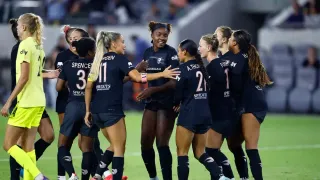
6 hours ago
James Lu's $3.5 Billion Bid to Take Grindr Private: A Pivotal Moment for Queer-Founded Tech
READ TIME: 5 MIN.
In a move that signals shifting priorities for one of the world's most recognizable queer-founded technology companies, James Lu stepped down from his role as chair of Grindr's board of directors last week, simultaneously announcing an ambitious plan to take the platform private. The buyout proposal, valued at approximately $3.5 billion, represents a significant moment in the history of LGBTQ+ entrepreneurship and the broader narrative of queer-led businesses navigating public markets.
Lu, who has served on Grindr's board for more than five years and co-led the company's initial public offering in November 2022, explained his departure as a strategic decision rather than a sign of dissatisfaction with the company's direction. In a letter to board members, Lu wrote: "My decision to resign from the Board is not a reflection of my views on Grindr. I remain optimistic about Grindr's long-term prospects, as demonstrated by the proposal and my desire to take the company private to refocus and execute on opportunities to grow the business."
The resignation itself reflects a common practice in corporate governance: when board members submit acquisition proposals, they typically step down to avoid conflicts of interest. Lu's move allows the board to form an independent special committee to evaluate the proposal objectively, a process that was already underway as of October when the board formed a special committee to respond to what it characterized as an "unsolicited take-private proposal."
The proposed buyout offers compelling financial details that underscore the valuation tensions within Grindr's public trading. Lu and Zage are offering $18 per share in cash to acquire the remaining equity they do not already control. This offer comes at a time when Grindr's shares were trading around $15 each in midday trading on Monday, representing a 20% premium to the market price at the time of the announcement.
The shareholders who would benefit from this premium include institutional investors and early backers who have held positions in the company since its public debut. For many in the LGBTQ+ community who have invested in Grindr as both a financial and cultural asset, the offer represents a validation of the company's worth—though it also signals that the founders believe the platform's true value may not be fully reflected in public market valuations.
Lu emphasized the value proposition in his communication to board members, noting that the buyout offer valued shares "at a significant premium for shareholders." This framing is significant for queer investors and stakeholders who have supported Grindr's transition to public markets, as it acknowledges their financial interests while positioning the deal as mutually beneficial.
The timing of the take-private proposal is particularly noteworthy given Grindr's exceptional financial performance in 2025. The company reported total revenue of $116 million for the third quarter alone, representing a 30% year-over-year increase. More impressively, the company's quarterly net income reached $31 million, demonstrating robust profitability.
Executives at Grindr have characterized 2025 as the most successful year in the company's history in terms of both profitability and engagement growth. This achievement is particularly significant when contextualized against the broader dating app industry, where major competitors have struggled. Other mainstream dating platforms, including Tinder and its parent company Match Group, have been dealing with user retention challenges that have impacted their financial performance.
Despite this strong operational performance, Grindr's public shares have declined more than 15% over the course of 2025, a disconnect that may explain why Lu and Zage believe taking the company private represents the optimal path forward. The gap between operational success and stock price performance is a common phenomenon in technology markets, particularly when public investors have different expectations or concerns about a company's long-term trajectory.
The decision to pursue a take-private transaction reflects a strategic philosophy that prioritizes long-term value creation over quarterly earnings pressures. By removing the company from public markets, Lu and Zage would have greater flexibility to make investments that may not immediately boost quarterly earnings but could strengthen Grindr's competitive position and user experience over time.
For a platform that serves the LGBTQ+ community, this operational freedom carries particular significance. Public companies face constant scrutiny from investors with varying values and priorities. A privately held Grindr could potentially make decisions around content moderation, user safety features, and community-focused initiatives without the pressure to justify every decision to shareholders focused primarily on financial returns.
Lu and Zage indicated that they are targeting a deal closure in the first few months of 2026, suggesting a relatively compressed timeline for board evaluation and shareholder voting. This timeline would position Grindr to transition to private ownership by the middle of next year if all approvals proceed smoothly.
The Grindr take-private proposal arrives amid a broader trend of technology companies and consumer brands returning to private ownership. The Los Angeles Times noted that both the Manhattan Beach-based sneaker company Skechers and the Los Angeles-based fashion brand Guess were taken private during 2025, suggesting that private equity-backed or founder-led buyouts remain a popular strategy for mature technology and consumer companies.
For the queer technology ecosystem, Grindr's potential transition back to private ownership represents a significant moment. The company has served as a visible symbol of LGBTQ+ entrepreneurial success since its founding, and its 2022 IPO was celebrated within the community as a milestone for queer-led technology companies. A return to private ownership does not diminish that achievement; rather, it reflects an evolution in how the company's founders believe they can best serve their user base and stakeholders.
Despite the formal proposal and stated timeline, significant uncertainty remains. Grindr itself acknowledged in an October 24 release that "There is no assurance that this proposal will result in a transaction or any other strategic outcome." The special committee formed by the board will need to evaluate the proposal, potentially solicit competing bids, and ultimately recommend a course of action to shareholders.
For Grindr's users and the broader LGBTQ+ community, the outcome of this process carries implications beyond financial returns. The platform has evolved into an essential social infrastructure for many queer people, particularly in regions where LGBTQ+ community spaces are limited. Questions about ownership structure, investment priorities, and long-term strategic direction all matter to the millions of people who rely on Grindr for connection, dating, and community.
The next months will reveal whether Lu and Zage's vision for a privately held Grindr can secure board approval and shareholder support, or whether competing interests will shape a different outcome for the company. Regardless of the result, the proposal underscores the ongoing evolution of queer-founded technology companies and the complex dynamics of building and scaling platforms that serve the LGBTQ+ community.






